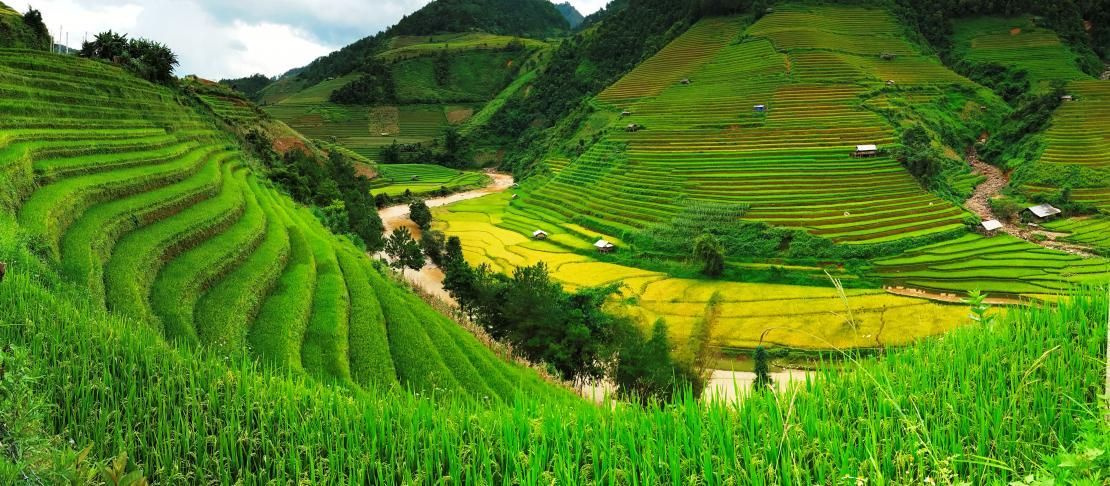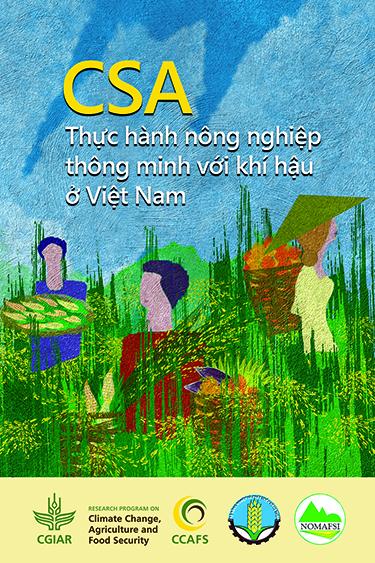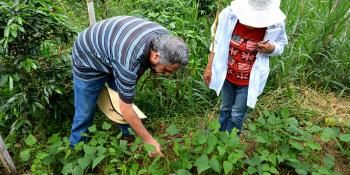A menu for climate-smart agriculture outscaling in Vietnam

A book provides a list of climate-smart agriculture options for outscaling in the different agro-ecological regions of Vietnam.
Vietnam is one of the countries severely affected by climate change. In the last five years, strong typhoons, flooding, cold spells, salinity intrusion, and drought have affected agriculture production across the country, from upland to lowland regions. Fortunately for Vietnam, works on climate-smart agriculture (CSA) development have been continuously implemented by innovative farmers, entrepreneurs, and research organizations.
In Vietnam, there is an increasing trend of CSA adoption to mitigate and adapt to the impacts of climate change in agriculture. However, there is a need to accelerate the scaling process of CSA technologies and practices in order to ensure growth of agriculture production and food security, increase farmers' incomes, make farming climate-resilient, and contribute to global climate change mitigation.
To help in the efforts of mainstreaming CSA in the country, a team of local experts, led by Dr. Pham Thi Sen of the Northern Mountainous Agriculture and Forestry Science Institute (NOMAFSI), compiled various CSA technologies and practices in Vietnam in the book entitled “CSA: Thực hành nông nghiệp thông minh với khí hậu ở Việt Nam”. Published in Vietnamese by the CGIAR Research Program on Climate Change, Agriculture and Food Security (CCAFS) in Southeast Asia, the book aims to provide basic information to researchers, managers, and technicians and extentionists at different levels, on the CSA technologies and practices that can be scaled in different locations in Vietnam.
The book is divided into four major parts. Chapter one provides a good introduction on the CSA concept and gives a general review of CSA initiatives in Vietnam. This includes the traditional efforts of communities to cope with adverse climate conditions, current policies and strategies of the government, and programs implemented by international development organizations.
The second chapter provides an overview of the natural and socio-economic conditions of the different agro-ecological regions of Vietnam. Each region is described in terms of the natural and socio-economic conditions, main production systems and products, climate change impacts, and adaptation and mitigation needs.
Chapter three features more than 70 CSA technologies and practices in Vietnam. These CSA technologies and practices are categorized into:
- Forest and water resources and landscape
- Biomass recycling and agricultural residue treatment
- Integrated crop management
- Water storage and water saving irrigation
- Sustainable farming on sloping lands
- Home gardens and agroforestry
- Rice production
- Maize and cassava production
- Sugarcane production
- Fruit production
- Perennial industrial crops (tea, coffee, pepper, chestnut, rubber)
- Animal husbandry
- Aquaculture
- Adaptive varieties, cropping systems and calendars
For each CSA technologies and practices, the basic description, cost and benefit for farmers, suitability, and barriers to adoption are discussed.
The last chapter provides the readers ways on how to promote the adoption of CSA technologies and practices. The main barriers to adoption and the measures for overcoming these barriers are described.
Launched during the joint CCAFS SA-SEA CSA workshop, copies of the book were distributed to the research institutes under the Vietnamese Academy of Agricultural Sciences, provincial Department of Agriculture and Rural Development offices, and to the various national and provincial extension networks. The CSA technologies and practices described in the book will be mapped and disseminated online in 2018.
For feedback or to request for a copy, please contact by Dr. Pham Thi Sen of NOMAFSI at phamthisenprc@gmail.com.
Download the book (in Vietnamese): Pham Thi Sen, et al. 2017. CSA: Thực hành nông nghiệp thông minh với khí hậu ở Việt Nam. Wageningen, Hà Lan: Chương trình Nghiên cứu của CGIAR về Biến đổi Khí hậu, Nông nghiệp và An ninh Lương thực (CCAFS).
Read more:
- CCAFS blog: Perceptions from the farm: farmer assessments of adopted climate-smart technologies and practices
- CCAFS blog: Harnessing the role of extension workers in climate-smart agriculture outscaling
- CCAFS blog: A climate-smart way to improve soil fertility
Eisen Bernardo is the Senior Communication Specialist of CCAFS Southeast Asia.




